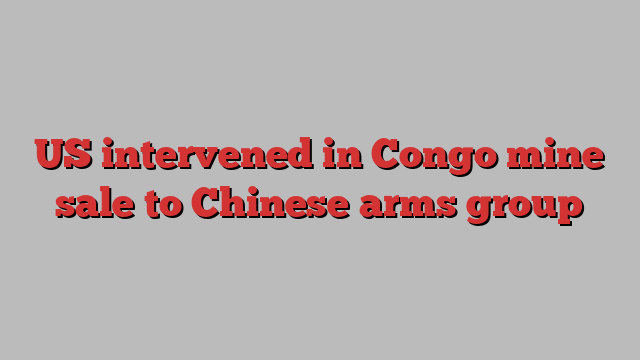
Stay informed with free updates
Simply sign up to the Mining myFT Digest — delivered directly to your inbox.
The US has intervened in the sale of a Congolese copper mine to a Chinese arms manufacturer in an effort to prevent Beijing from further increasing its control of critical minerals, according to people familiar with the matter.
US officials encouraged the Democratic Republic of Congo’s state-owned miner Gécamines to review the sale, announced last week, of Trafigura-backed Chemaf Resources to Norin Mining, a subsidiary of China’s state-owned defence company Norinco, the people said.
The move is part of Washington’s efforts to improve access to metals for US-friendly companies amid increasingly fierce competition between the west and China for control of the minerals needed for clean energy infrastructure. The US state department did not respond to a request for a comment.
Chemaf leases the permit for its flagship project Mutoshi from Gécamines. The state-owned miner claimed that it should have been informed of the deal in advance and that any change in “direct or indirect” control could not take place without its approval.
Gécamines said in a statement on Monday that its board vetoed the deal after learning of it through the media.
Chemaf said it notified Gécamines prior to the announcement of the sale and was yet to receive any correspondence from the state miner. It added that it already received approval from Congo’s minister of mines.
“The company ran a broad international sales process and received significant interest from several US groups. However, none of this US interest culminated in a transaction capable of execution,” it said in a statement to the Financial Times.
Gécamines has a history of intervening in the sale of mining assets to block transactions, renegotiate its rights or extract payments. New chair Guy Robert Lukama was appointed in 2023 with a mandate to turn around the struggling entity and has said he would review unfavourable contracts and joint ventures.
A person close to Gécamines, who asked not be identified, said the company was acting to protect its contractual rights and assess the best options for the development of the project.
Under Lukama, Gécamines wants to market more of the ore produced on its concessions and to mine more areas itself.
Norinco describes itself on its website as “the main supplier of Chinese Army weaponry and equipment” and a “leader of international co-operation in China’s defence industry”.
It already has two other copper-cobalt mines in Southeastern Congo. Norinco did not respond to a request to comment.
The assets Norinco hopes to acquire from Chemaf include two producing mines, Mutoshi and Etoile, and several other mining licenses that could hold further resources.
Cobalt and copper are vital metals for military equipment since they are used in superalloys for fighter jets, as well as wiring and munitions.
A UN report in 2020 found that Norinco was among Chinese companies that had supplied arms to Congo at least eight times between 2015 and 2019. The US Treasury has prohibited American companies or individuals from owning shares in Norinco since 2020.
Trafigura arranged a $600mn loan to Chemaf in 2022 in return for rights to market its cobalt hydroxide and remains the company’s largest creditor.
The facility was intended to help Chemaf compete the construction of a fully-mechanised mine at Mutoshi and expand a processing plant at Etoile but rising costs and falling cobalt prices have stalled the company’s plans.
Under the terms of the Norinco deal, Trafigura would be repaid in full.
Trafigura approached the US government and other parties asking for help to find buyers when the sales process was first announced last year, according to three people familiar with the matter. Trafigura declined to comment.
Washington attempted to introduce potential parties, which included KoBold Metals. But the start-up backed by Bill Gates’ venture fund pulled out after considering a bid. KoBold Metals declined to comment.